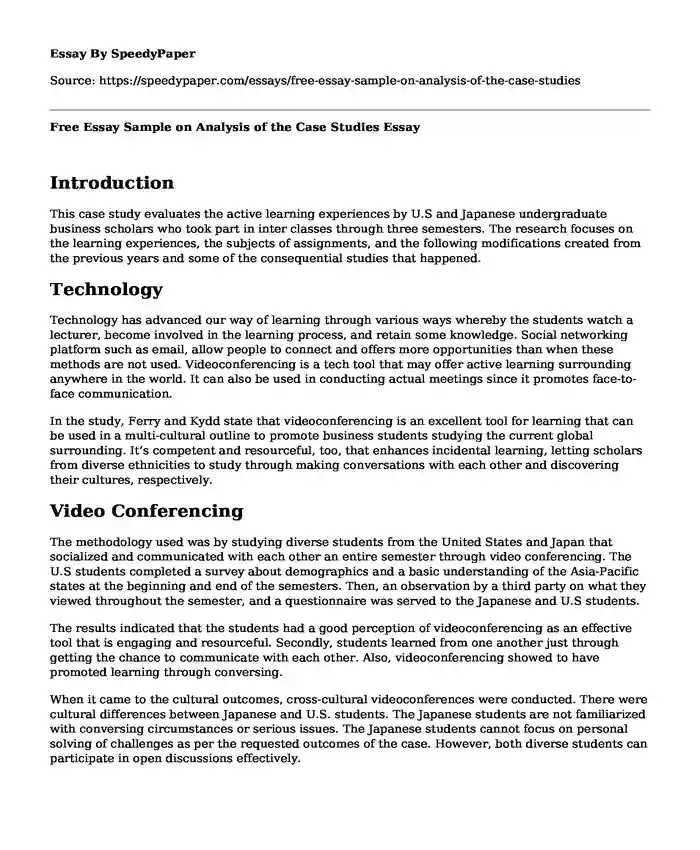
| Type of paper: | Essay |
| Categories: | Management Students Business Ethical dilemma Conflict resolution |
| Pages: | 3 |
| Wordcount: | 582 words |
Introduction
This case study evaluates the active learning experiences by U.S and Japanese undergraduate business scholars who took part in inter classes through three semesters. The research focuses on the learning experiences, the subjects of assignments, and the following modifications created from the previous years and some of the consequential studies that happened.
Technology
Technology has advanced our way of learning through various ways whereby the students watch a lecturer, become involved in the learning process, and retain some knowledge. Social networking platform such as email, allow people to connect and offers more opportunities than when these methods are not used. Videoconferencing is a tech tool that may offer active learning surrounding anywhere in the world. It can also be used in conducting actual meetings since it promotes face-to-face communication.
In the study, Ferry and Kydd state that videoconferencing is an excellent tool for learning that can be used in a multi-cultural outline to promote business students studying the current global surrounding. It’s competent and resourceful, too, that enhances incidental learning, letting scholars from diverse ethnicities to study through making conversations with each other and discovering their cultures, respectively.
Video Conferencing
The methodology used was by studying diverse students from the United States and Japan that socialized and communicated with each other an entire semester through video conferencing. The U.S students completed a survey about demographics and a basic understanding of the Asia-Pacific states at the beginning and end of the semesters. Then, an observation by a third party on what they viewed throughout the semester, and a questionnaire was served to the Japanese and U.S students.
The results indicated that the students had a good perception of videoconferencing as an effective tool that is engaging and resourceful. Secondly, students learned from one another just through getting the chance to communicate with each other. Also, videoconferencing showed to have promoted learning through conversing.
When it came to the cultural outcomes, cross-cultural videoconferences were conducted. There were cultural differences between Japanese and U.S. students. The Japanese students are not familiarized with conversing circumstances or serious issues. The Japanese students cannot focus on personal solving of challenges as per the requested outcomes of the case. However, both diverse students can participate in open discussions effectively.
Language Barrier
There was a language barrier in the interactions as the primary language used was English. The American students had to modify their response pace in the conversations. Students used open-mindedness and self-knowledge as they interacted, thus allowing them to have diverse experiences while talking to different cultural individuals at the videoconference.
Conclusion
Cross-cultural management in business assists us in comprehending people originating from diverse cultures. It is essential because most companies today are expanding their businesses to a global market. In today’s world, managers have to deal with individuals and clients from diverse countries, whose culture is distinct from the domestic country. Many organizations have also discovered that diversification can promote the effectiveness of the organization. However, to get better advantages, an organization has to make effective strategies and straight forward initiatives that will make the company be entirely a multi-cultural enterprise.
References
Ferry, D. L., Kydd, C. T., & Boyles, C. (2012). Creating the global graduate: A CrossCultural videoconferencing case study. Decision Sciences Journal of Innovative Education, 10(2), 139-164.
Hamilton, J. B., Knouse, S. B., & Hill, V. (2009). Google in China: A manager-friendly heuristic model for resolving cross-cultural ethical conflicts. Journal of Business Ethics, 86(2), 143-157.
Cite this page
Free Essay Sample on Analysis of the Case Studies. (2023, Nov 07). Retrieved from https://speedypaper.net/essays/free-essay-sample-on-analysis-of-the-case-studies
Request Removal
If you are the original author of this essay and no longer wish to have it published on the SpeedyPaper website, please click below to request its removal:
- Essay Sample on Women in Prison: Who Takes Care of the Children?
- Free Essay about Social Work as a Health Profession
- Essay Sample on Emerging Opportunities for Organizational Leadership Consulting
- Essay Example. Channels of Communication and Corporate Social Responsibility
- Essay Example. Head Coach of the Navarro College Cheer Team
- Essay Sample on Hook: As a Daily Driver of America, Transportation Is Something We Fathom.
- Business Ethics and Environment - Essay Sample
Popular categories




